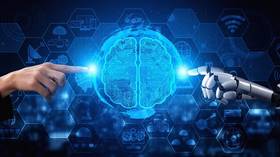Boosting AI research: Will artificial brains replace human ones?

There is a wide range of areas where artificial intelligence technology may be of use. All of these areas require qualified staff, and educating them is becoming a priority for Russian universities.
Artificial Intelligence investigation has become one of the main research fields in modern Russia. Now, it’s no longer just a matter for a small group of specialists, but an area of great interest for students and young professionals. AI education and investigation is one of the main areas of focus for the universities taking part in the ‘Priority 2030’ academic leadership program, which was launched in Russia this year.
It’s a major initiative, led by Russia’s Ministry of Science and Higher Education, which aims to boost higher education and research programs. The academic leadership program wants the country’s higher education centers to become more attractive to foreign students and scientists. Priority 2030 opened for business this summer, and after several months, over one hundred Russian universities were chosen as participants. All of them would get at least 100 million rubles ($1.4 million) annually for the development of their projects. Dozens of participants also applied for special grants, which provide the opportunity to receive up to 1 billion rubles ($13.6 million) annually.
While one of the main tasks for the participants is to educate future specialists on how to work with AI, the question ‘Will AI and robots make people useless?’ has a clear answer: People will always be needed, it’s just that their skills will have to be modified.
AI driver
One of the areas in which AI is being successfully applied is the transport system. For example, it can be used to analyze transportation risks, and monitor, optimize, and control different processes, etc. – no matter whether it’s air, land, railway, or water transport. The new technology is finding broader applications day by day, so it requires qualified staff. The Russian University of Transport, under the Priority 2030 program, is working in both directions – researching ways to include AI in all types of transport, as well as educating professionals on how to manage it. Future professionals will have to work with face recognition systems and biometric data, monitor quality of roads, and boost logistics efficiency (which still depends a lot on manual labor). All this requires not only technical knowledge, but also management and IT skills.
Analysts expect AI technology to optimize the industry and to cut economic costs. The final price for consumers will be reduced as well.
In 2023, the university will launch its bachelor’s degree program, “Neurotechnology, AI and Predictive Analytics in Transport Systems,” and a year later, a follow-up master’s degree program is scheduled to be introduced.
Atomic copy
What should you do if you have to teach your student how a nuclear reactor functions? Take them to a real one? Quite dangerous. Build a replica? But would it be enough for everyone to investigate every single detail of the reactor? Now, there is a solution: make a virtual copy, like the one being created in the National Research Nuclear University MEPhI, which is also a Priority 2030 participant. It allows students to simulate processes that can’t be performed on a real reactor – to increase power, change its parts, and connect and disconnect devices. Also, it simulates dealing with emergencies and virtually managing and repairing the reactor.

“Also, this project may be used for science popularization and for scientific tourism, it may boost students’ interest regarding modern digital technologies,” the university’s deputy head Georgy Tikhomirov told the media.
Searching for an AI ethics consensus
Do future diplomats need AI? The answer may be provided by Priority 2030 participant Moscow State Institute of International Relations. In October, it inaugurated its AI Center, which is aimed at researching ethical problems and foreign economic relations surrounding the technology, as well as boosting scientific collaboration with investigative centers from Russia and abroad. The university wants to become an expert hub and will consult state organizations over problems related to AI and its regulation, as well as digital economy matters.
In October 2021, the Center organized its first event – the roundtable discussion “AI Ethics: Searching for Consensus.” In December, it hosted the conference “AI Global Dimension: From Discussion to Practice.” The Center works in both Russian and English languages. It is also tasked with publishing research results in specialized media outlets.
In 2018, the university launched an AI master’s program, and its graduates are already employed in the Center. The program has numerous partners, such as ADV, Microsoft, and NVIDIA.












